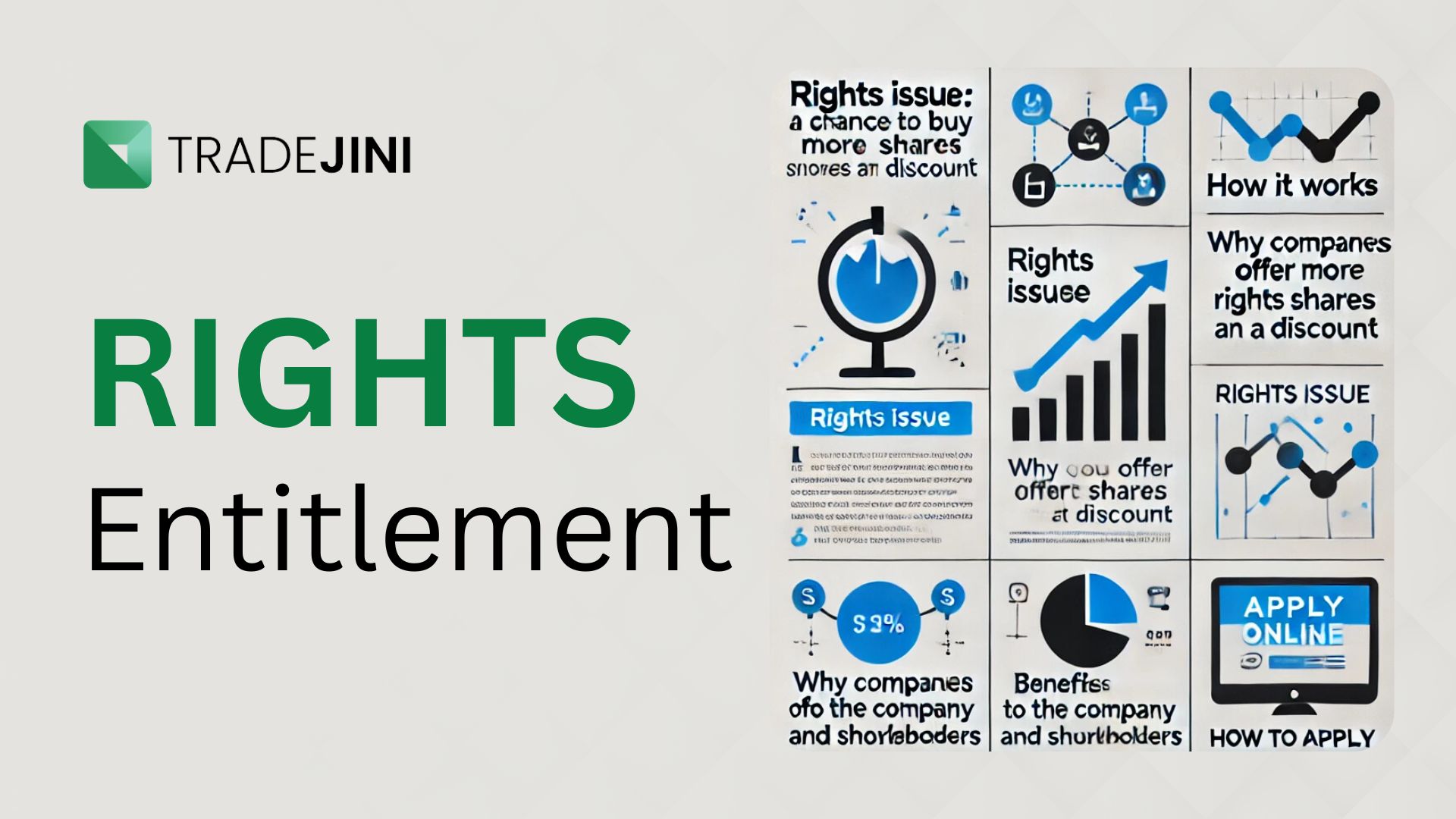What is Rights issue?
Rights issue is one of the many modes of raising capital. When a company plans a rights issue, it gives the existing shareholders the opportunity to purchase additional shares of the company normally at a discounted price.
What is Rights entitlement?
One important distinction to note is the difference between the rights entitlement (RE) and rights themselves. When you receive RE, you only receive the entitlement and not the actual rights shares. These RE’s are issued in an electronic format, that is, in a dematerialized form under a separate temporary ISIN created by Depositories which will be reflected in the Demat account where you held the shares of the underlying company on the record date.
To simplify further, Shareholders of the company, as on the record date, will be credited REs into their Demat account by the company. Further, the public may buy or sell REs from the shareholders who are willing to renounce their entitlement as these RE’s are listed on the stock exchange during the period of rights issue. This process is an innovative step implemented by the regulator to provide liquidity to shareholders, who do not wish to apply, fairly and transparently like any other securities listed on the stock exchange.
How does one apply for a Rights Issue?
- Ensure that you have access to your net banking service.
- Log in to your net banking platform through the website or mobile app.
- Locate the 'IPO (ASBA)' or 'Rights' option in the platform menu.
- Click on ‘Add ASBA Beneficiary.’
- Select and enter your Depository Participant details, and provide your BO ID. Submit this information.
- Go to the IPO/FPO/Buyback section, where the available rights issues will be displayed.
- Select the Geojit financial services rights issue, specify the number of shares you want to apply for.
- Then select your investor category and make the payment for the issue price and submit.
- Submit your application after reviewing and accepting the Terms & Conditions.
How does Rights Issue work?
To understand the mechanism of the rights issue, let us take an example of Geojit Financial services.
The company’s rights issue started on the 15th of October. They decided the ratio to be 1:6, that is, 1 Rights shares for every 6 fully paid-up equity shares held as of the record date of 7th October, 2024.
The shareholders with the REs could sell their REs in the secondary market up until the 17th of October 2024. However, shareholders who decide not to sell their REs need to apply for the rights issue on or before October 23th, 2024 for them to qualify for receiving the rights shares.
How can shareholders proceed with their REs?
Shareholders with REs have the following options to choose from-
- Shareholders can use all their REs to apply for the number of shares they are entitled to.
- Shareholders can apply for all the shares they are entitled to and also apply for additional shares.
- Shareholders can apply for a portion of the shares they are entitled to and renounce the remaining REs by selling in the secondary market.
- Shareholders can renounce all their REs by selling in the secondary market, if they do not wish to apply for rights shares.
- Shareholders can take no action and let their REs lapse if they choose not to apply in case the underlying share price is less than the rights issue price or due to any other reasons the shareholder deems fit.
Renunciation is another jargon in this topic. Let us understand what this means.
Also Learn: Guide to Demat Share Transfers: How to Move Shares Between Accounts
What is renunciation of REs?
Renouncing REs is where the shareholder renounces or sells the RE held by him/her to other interested investors in the secondary market. This can be done in two ways-
- On-Market Renunciation: One can sell their REs directly on the stock exchange through a stockbroker.
- Off-Market Renunciation: One can also transfer their REs directly to another person (off-market) through a depository.
Note that renunciation of REs must be done before a deadline, which is announced by the company themselves. After the deadline, the trading of REs will cease, leaving RE holders with the sole option to apply for Rights shares.
Consequences of Inaction
It is very important to understand that inaction can lead to unfavourable financial outcomes. Once the shareholders get the RE, they are required to take some sort of action. They can either apply for Rights issues or they can renounce their REs in the open market.
However, if the shareholders who have received the RE choose to take no action, it may result in a massive blunder. Their RE will lapse or extinguish worthless, thus missing a financial opportunity.
Conclusion
In summary, rights issues offer shareholders the opportunity to buy additional shares at a discounted price, helping companies raise capital. Shareholders can choose to exercise their rights, purchase more shares, or renounce their entitlements. It's essential to act within the given timelines to benefit from the rights issue.
Investors can find all the information related to REs in the the email received from the registrar and the letter of offer filed by the company and available on the SEBI website under "Home » Filings » Rights Issues."
To know more, please connect with our support team by writing to us at help@tradejini.com
With that said, Thank you!



